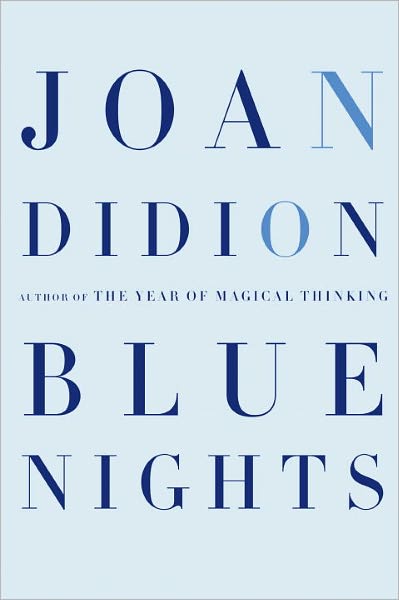One of the best ways to understand and appreciate a book’s importance and impact is to hear from someone who found solace in the words. I was perusing Nina Sankovitch’s exceptional blog, Read All Day, and she writes eloquently about the comfort found in books. She was writing about Joan Didion’s BLUE NIGHTS specifically but also about all books, and art, in general.
Most of us make it through to the other side of grief. We will never be returned to who we were before — we are changed, perhaps even maimed — and yet we are still here, whether we want to be or not.
The morning we wake up and notice once again the spreading pink sky of sunrise or look forward to the deepening blue at dusk is proof of our resilience. Art helps us to understand what life offers, both in the fullness of our present sorrow and in the promise of a morning after.
I selected BLUE NIGHTS as one of my favorite non-fiction books of 2011 on NPR’s The Emily Rooney Show because I truly believe that no one writes narrative non-fiction as beautifully as Ms. Didion. Stunningly gorgeous and achingly honest.
Summary: From one of our most powerful writers, a work of stunning frankness about losing a daughter. Richly textured with bits of her own childhood and married life with her husband, John Gregory Dunne, and daughter, Quintana Roo, this new book by Joan Didion examines her thoughts, fears, and doubts regarding having children, illness, and growing old.
Blue Nights opens on July 26, 2010, as Didion thinks back to Quintana’s wedding in New York seven years before. Today would be her wedding anniversary. This fact triggers vivid snapshots of Quintana’s childhood—in Malibu, in Brentwood, at school in Holmby Hills. Reflecting on her daughter but also on her role as a parent, Didion asks the candid questions any parent might about how she feels she failed either because cues were not taken or perhaps displaced. “How could I have missed what was clearly there to be seen?” Finally, perhaps we all remain unknown to each other. Seamlessly woven in are incidents Didion sees as underscoring her own age, something she finds hard to acknowledge, much less accept.
Blue Nights—the long, light evening hours that signal the summer solstice, “the opposite of the dying of the brightness, but also its warning”—like The Year of Magical Thinking before it, is an iconic book of incisive and electric honesty, haunting and profoundly moving.


One resolution I have made, and try always to keep, is this — To rise above the little things.-John Burroughs